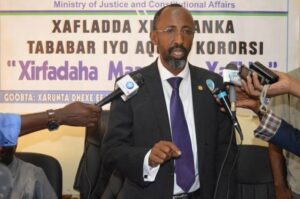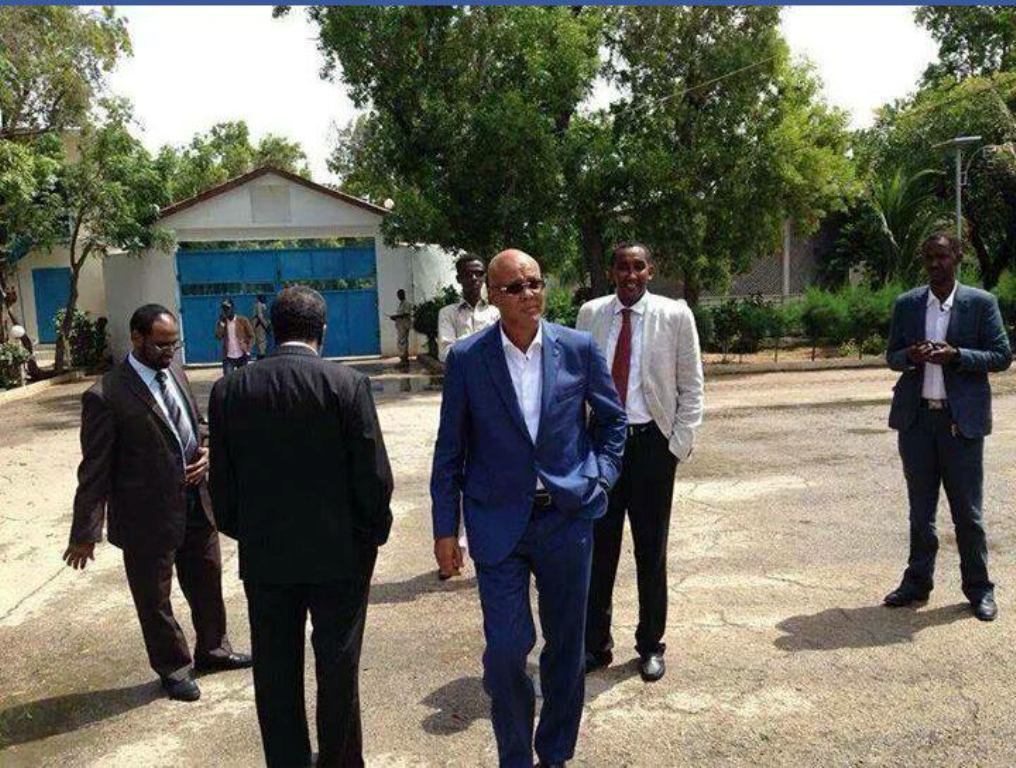Mogadishu (HAN) October 26, 2014. Public diplomacy and Regional Security Industry Tracker news. Somali governance crisis is two step forward with two step backward. Somalia Prime ministers’s plan to seize a personal goal and to evict one of the hard-workers of the ministerial council from his inner circle cabinet has come amiss. But to turn around Lenin’s quote, “two steps forward, one step back.”
creating confusion in the system of governance: Whenever Somalia institutions get established and hope finally becomes a light at the end of the tunnel, here comes a deliberately engineered setback. Somalia’s infant institutions are in danger more than anytime before.
When hard-working public figures are dismissed overnight simply because of political alienation even when the very public figure is exceptionally performing and gifted his public career to serve his people by setting up institutions to serve them afterwords.
Ministry of justice and constitutional affairs in general and its immediate former minister has done commendable job to revive the very key institutions that serves justice, law and order in our society. These star shining achievements include:
Already established institutions
Almost completed structures
The limited cabinet portfolio reshuffle announced by the Somalia prime minister is a diversion from vision 2016 in totality and a two step backward. It’s only political tolerance and constant consultation that moves this country.
If this mini reshuffle carries the day, the democratic, security and all other gains made in regard to nation building so far becomes wasted.
In Somalia: Consensus decision-making is an alternative to commonly practiced adversarial decision-making processes.

The Somali Principles of Consensus Decision Making
Consensus decision making is a process used by groups seeking to generate widespread levels of participation and agreement. There are variations among different groups regarding the degree of agreement necessary to finalize a group decision. The process of group deliberation, however, has many common elements that are definitive of consensus decision making. These include:
- Inclusive: As many stakeholders as possible are involved in group discussions.
- Participatory: All participants are allowed a chance to contribute to the discussion.
- Collaborative: The group constructs proposals with input from all interested group members. Any individual authorship of a proposal is subsumed as the group modifies it to include the concerns of all group members.
- Agreement Seeking: The goal is to generate as much agreement as possible. Regardless of how much agreement is required to finalize a decision, a group using a consensus process makes a concerted attempt to reach full agreement.
- Cooperative: Participants are encouraged to keep the good of the whole group in mind. Each individual’s preferences should be voiced so that the group can incorporate all concerns into an emerging proposal. Individual preferences should not, however, obstructively impede the progress of the group.
Consensus decision-making attempts to address the current Somali crisis of both Robert’s Rules of Order and top-down models. Proponents claim that outcomes of the consensus process include:
- Better Decisions: Through including the input of all stakeholders the resulting proposals may better address all potential concerns.
- Better Implementation: A process that includes and respects all parties, and generates as much agreement as possible sets the stage for greater cooperation in implementing the resulting decisions.
- Better Group Relationships: A cooperative, collaborative group atmosphere can foster greater group cohesion and interpersonal connection.
The Geeska Afrika Online is Free government-funded. HAN (Horn of Africa newsline) shapes its editorial policy free from political and commercial influence.
The latest updates Follow twitter.com/GeskaAfrika
Geeska Afrika Online (1985 -2014) – The International Gateway news and views about the Horn of Africa (Ethiopia, Eritrea, Somalia, Somaliland, Sudan, South Sudan, Djibouti, Kenya and Uganda), the best IGAD news and information Online Site for the last 20 Years.
–
HAN & Geeska Afrika Online (1985-2014), the oldest free independent Free Press in the region, brings together top journalists from across the Horn of Africa. Including Ethiopia, Somalia, Eritrea, Sudan, Djibouti, South Sudan, Uganda, Kenya, Oromo, Amhara, Somali, Afar and Harari. Plus, we have daily translations from 150 major news organizations in the Middle East and East African regions. Contact at news@geeskaafrika.com


Leave a Reply